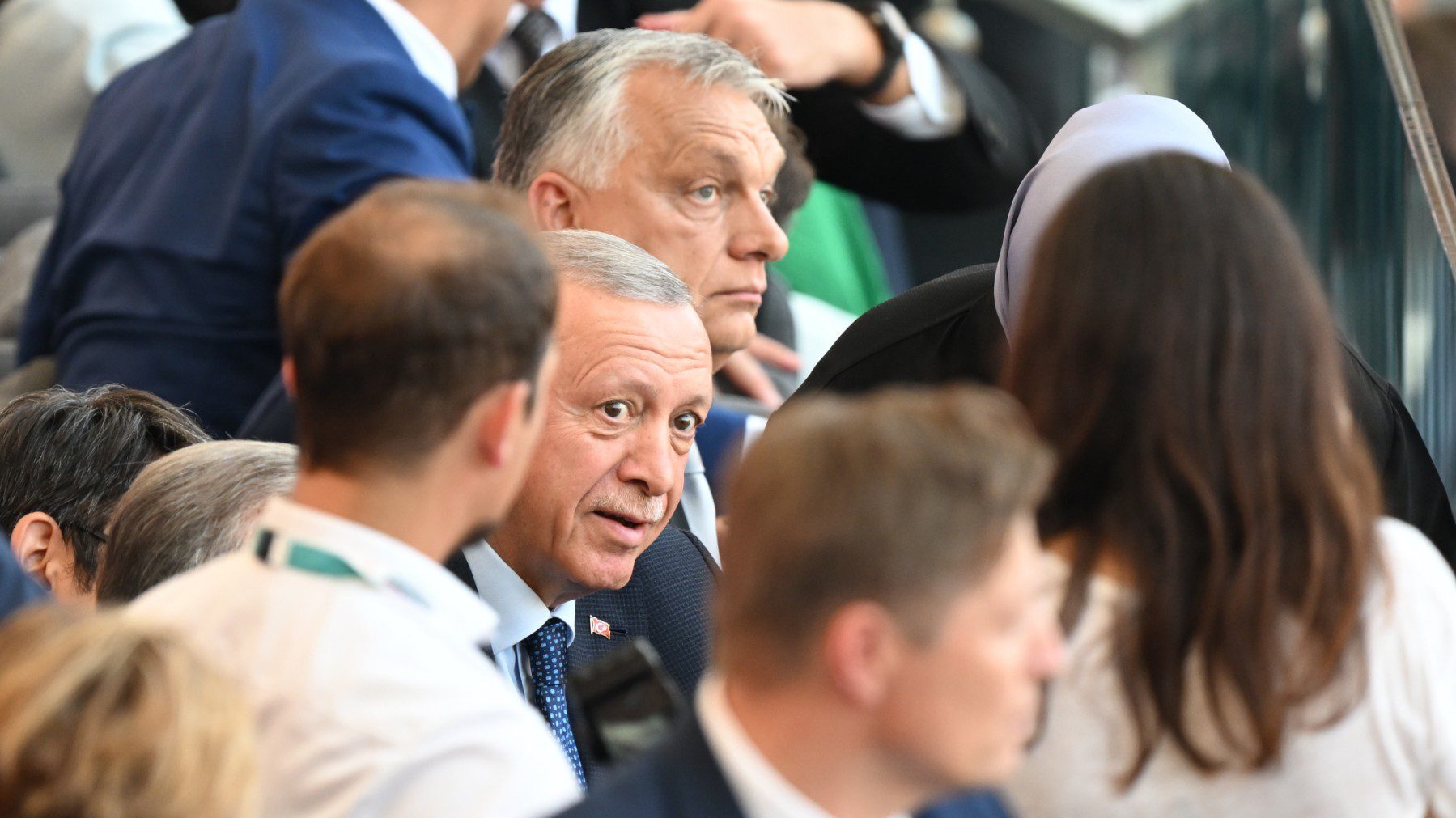
Turkey’s President Recep Tayyip Erdogan (C), Hungary’s Prime Minister Viktor Orban (C top), and other guests attend the World Athletics Championships at the National Athletics Centre in Budapest on August 20, 2023.
Photo: Photo by Ferenc ISZA / AFP
Hungary is intent on diversifying its energy supplies as the war rages on in Ukraine, with European sanctions against Russia making it difficult for the Central European country to maintain a stable energy flow. Hungarian Prime Minister Viktor Orbán made use of the World Athletics Championship in Budapest to welcome a myriad of Middle Eastern and Central Asian leaders in his bid to guarantee new routes of energy to Hungary.
One of the most important ones is the TurkStream pipeline which circumvents Ukraine and pumps gas directly from Russia across the Black Sea to Turkey, and from there through the Western Balkans to Hungary. Half of the country’s gas supply—4.8 billion cubic metres— came through this route last year. The strengthening of this energy cooperation and the deepening of the “strategic partnership” were both on the agenda as Viktor Orbán held talks with Turkish President Recep Tayyip Erdoğan on Sunday, August 20th. The two nations signed an agreement for Budapest to purchase 275 million cubic metres of natural gas directly from Ankara, making it the first time Turkey exports some of its gas to a non-bordering European country. Furthermore, Turkey’s status as a transit country will also become more relevant for Hungary due to future gas deliveries from Azerbaijan and Turkmenistan, Hungarian Minister of Foreign Affairs, Péter Szijjártó stressed.
Indeed, Azerbaijan’s President, Ilham Aliyev was one of the other foreign dignitaries Viktor Orbán had face-to-face talks with in Budapest. Discussions resulted in an agreement for Azerbaijan to provide 100 million cubic metres of gas this year and establish a gas transport link with Hungary.
🇦🇿🤝🇭🇺@PM_ViktorOrban received @presidentaz in his office earlier today. They discussed energy supply, physical security regarding the Ukraine conflict, and economic challenges. Azerbaijan will provide 100 million cubic meters of gas this year and establish a gas transport link… pic.twitter.com/7s4c62htFr
— Zoltan Kovacs (@zoltanspox) August 20, 2023
It is not just Hungary, but a spate of other European states are also looking to Azerbaijan for help during the midst of the war and the energy crisis. The European Commission gave its blessing and financial support to a deal struck last year between the leaders of Azerbaijan, Georgia, Romania, and Hungary on the construction of an electric cable running under the Black Sea to carry green Azeri energy from planned Caspian Sea wind farms to Europe.
Energy was the main topic on Monday too, as Emir of Qatar Tamim bin Hamad Al Thani met Viktor Orbán and Hungarian President Katalin Novák in Budapest. Péter Szijjártó announced last week that a political agreement has been reached, with Hungary set to receive shipments of liquefied natural gas (LNG) from Qatar starting in 2027. The Middle Eastern country has the world’s third-largest natural gas reserves after Russia and Iran.
Had a meaningful conversation with the Emir of #Qatar about the possibilities of cooperation between our 🇶🇦 🇭🇺 countries. Thank you very much @TamimBinHamad for your invitation, which I accepted, so we will soon continue building bilateral relations in Qatar. pic.twitter.com/ZUDs7CRT2H
— Katalin Novák (@KatalinNovak_HU) August 21, 2023
Politics was also on the table on the weekend in Budapest, as Hungary and Turkey discussed Sweden’s membership in NATO. Turkey has been blocking the Scandinavian country’s accession to the military alliance since Sweden applied for membership following Russia’s invasion of Ukraine last year. Ankara has cited Stockholm’s harbouring of Kurdish terrorists and the latest wave of Quran burnings in Sweden as a reason for delaying the ratification of Sweden’s membership. Hungary is the only other NATO member not to have ratified a Swedish accession, but experts believe more so for tactical reasons—aligning itself with its ally, Turkey—than outright criticism of Sweden. Péter Szijjártó promised that the Hungarian Parliament would come back to the issue after the summer holidays.
Western observers noted that Western European leaders were absent in Budapest for the start of the World Athletics Championship, with only former leaders Andrej Babiš of the Czech Republic, Sebastian Kurz of Austria, and Janez Janša of Slovenia in attendance.
🇭🇺@PM_ViktorOrban among friends at @wabudapest23@AndrejBabis @TamimBinHamad @sebastiankurz @JJansaSDS pic.twitter.com/xuWgjtesJf
— Zoltan Kovacs (@zoltanspox) August 20, 2023
Hungary has been the only EU member since the start of the Russo-Ukrainian war to call for peace and refuse military assistance to Ukraine. It is also the only EU member state to have maintained links with the Kremlin since the beginning of the war, with Péter Szijjártó regularly reminding critics that Hungary, a state very much reliant on Russian gas supplies, cannot heat houses with ideology and values. Hungary gets roughly 80% of its natural gas from Russia—primarily via the TurkStream pipeline—and has fought vigorously against sanctions on Russian energy proposed by the European Union. Serbian President Aleksandar Vučić promised on his visit to Budapest over the weekend that Serbia will provide Hungary with increased shipments of Russian natural gas if Ukraine follows through with ending a gas transit agreement with Russia.
